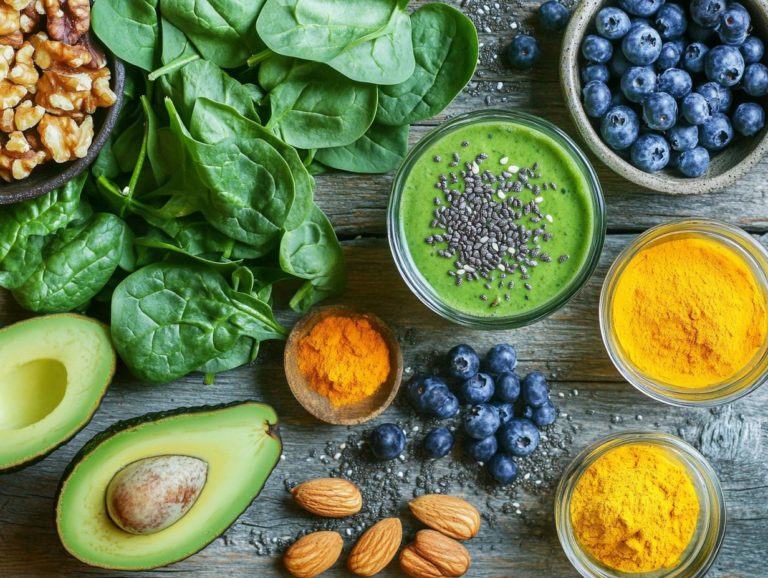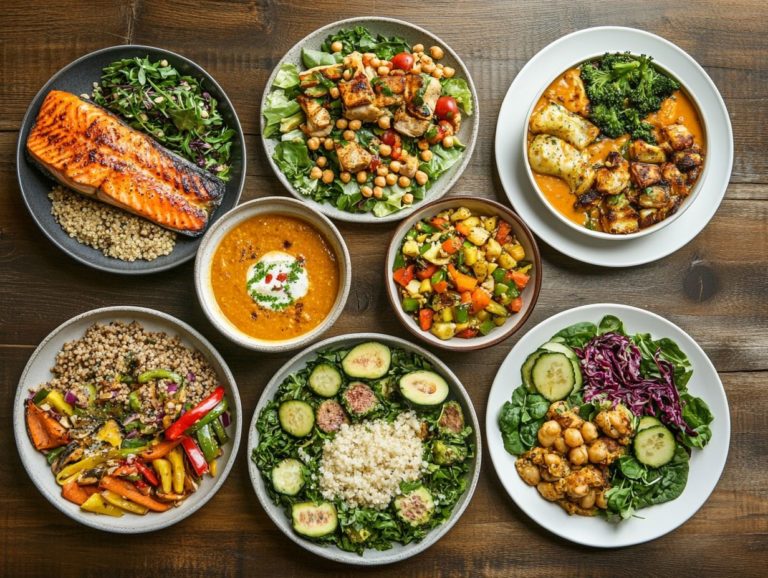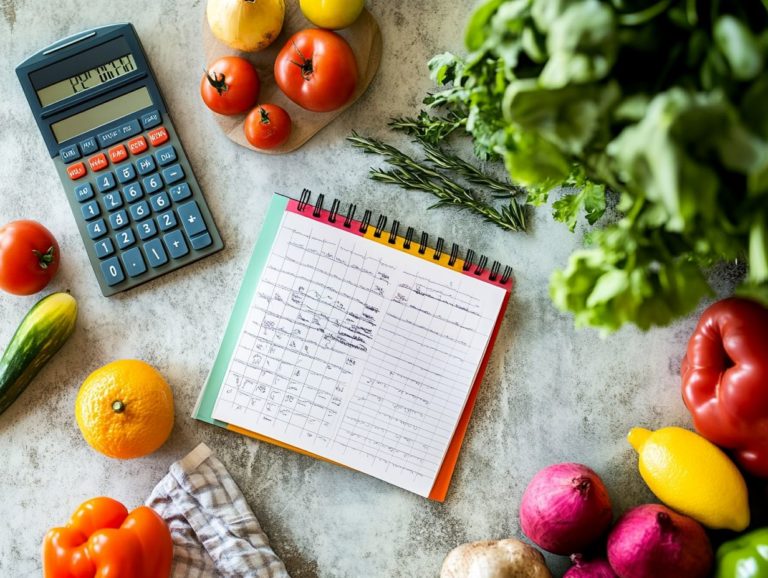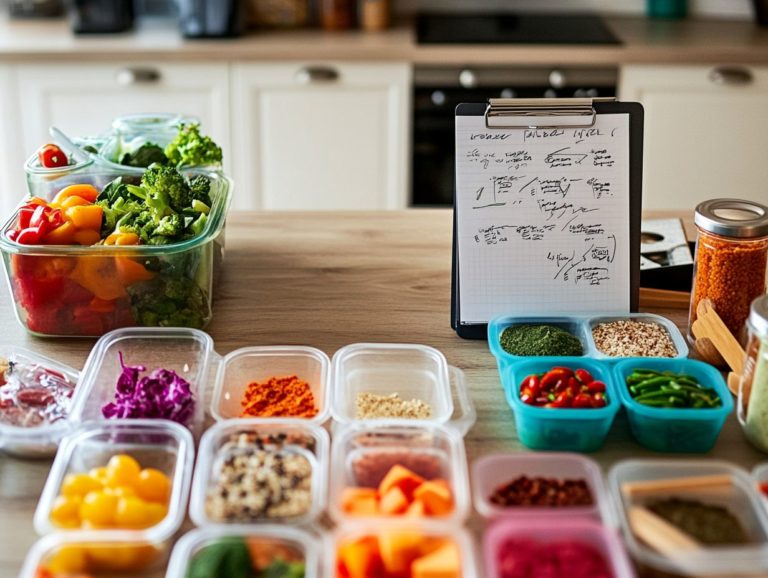Easy Meal Planning for Beginner Cooks
Meal planning is a game-changer for anyone aiming to eat healthier, save time, and reduce food waste.
Whether you’re a busy professional, a parent balancing family meals, or new to cooking, a well-structured meal plan can simplify your routine.
This guide offers a comprehensive approach, covering everything from essential kitchen tools to creating meal plans that cater to various dietary needs.
Get ready to discover tips that will change the way you cook! You’ll find ways to enhance efficiency, save money, and introduce time-saving techniques that transform your cooking experience.
Dive in and unlock the many benefits meal planning can bring to your life!
Contents
- Key Takeaways:
- Essential Tools for Meal Planning
- Creating a Meal Plan
- Meal Planning for Different Dietary Needs
- Ready to Make Meal Planning Fun and Budget-Friendly?
- Meal Prep and Cooking Techniques
- Frequently Asked Questions
- What is meal planning and why is it important for beginner cooks?
- How do I start meal planning as a beginner cook?
- What are some benefits of meal planning for beginner cooks?
- How can I make meal planning easier?
- What are some easy meal planning ideas for beginner cooks?
- How can I involve my family in meal planning as a beginner cook?
Key Takeaways:
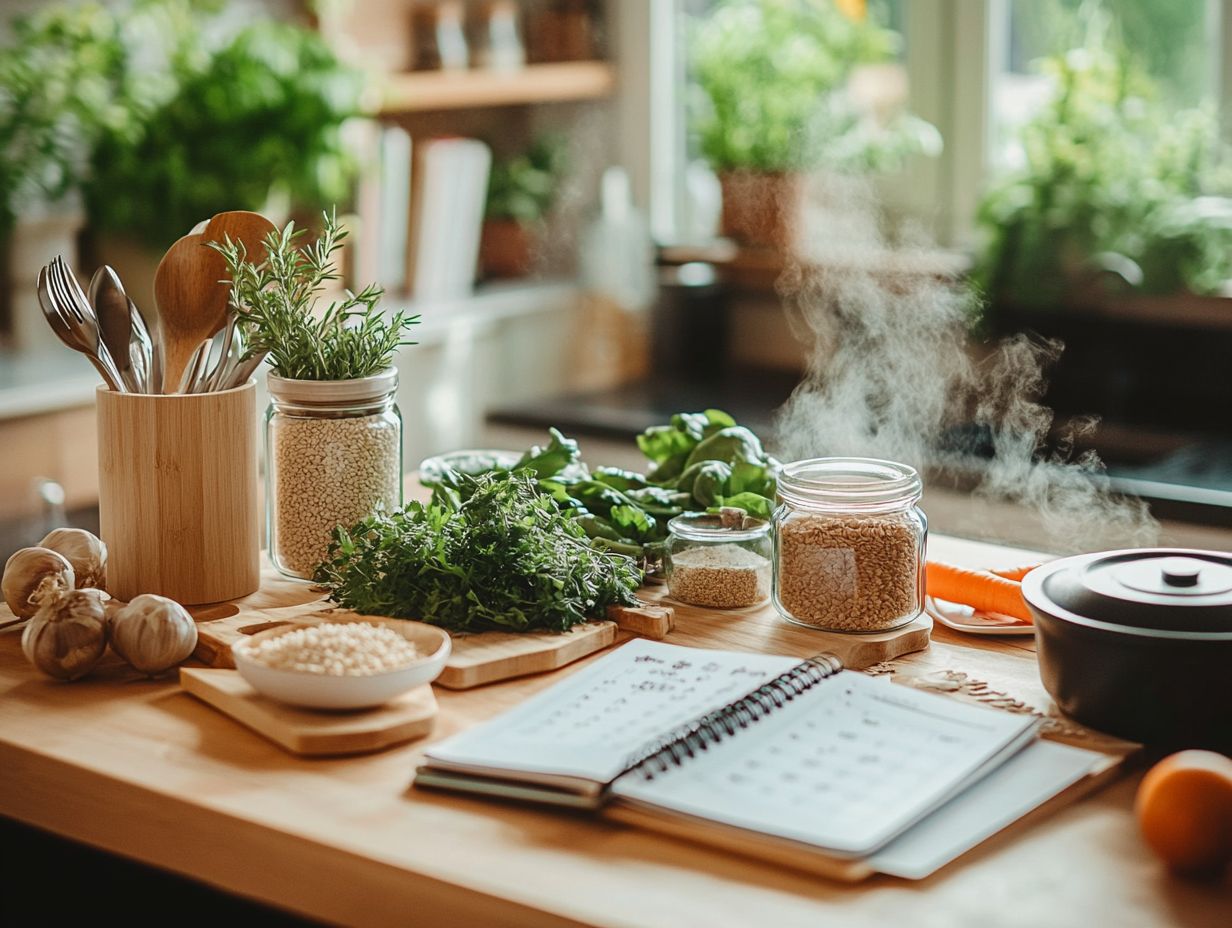
- Meal planning saves time and money by reducing food waste and eliminating last-minute grocery runs.
- Essential tools for meal planning include kitchen supplies, cooking equipment, and organization tools.
- You can accommodate different dietary needs through vegetarian, vegan, and gluten-free options.
Benefits of Meal Planning
Meal planning offers a wealth of benefits that can elevate your cooking experience and enhance your well-being.
By preparing meals in advance, you can save time and money, cut down on waste, and maintain a grocery list aligned with your health goals.
This approach leads to healthier meals that cater to your family s preferences.
Meal planning allows you to diversify your diet, making it easier to include various meal ideas and cooking tips.
You and your family can decide on weekly meals in advance. Grocery shopping becomes efficient; you make quick trips instead of wandering aimlessly.
This strategy minimizes waste, so you buy only what you need. It also keeps you within budget.
Imagine preparing vibrant stir-fries brimming with seasonal veggies or trying new recipes that everyone enjoys. This fosters collaboration and creativity in the kitchen.
By focusing on nutritious meals, you help everyone meet their health goals without feeling deprived. This brings your family closer over shared dinner experiences rich in flavor and connection.
Essential Tools for Meal Planning
Selecting the right tools is crucial for making cooking easier and achieving your health goals.
Meal templates can help you organize your week, while the right cooking equipment simplifies food preparation.
A well-structured grocery list helps minimize food waste, stick to your budget, and maximize meal variety.
Kitchen Supplies and Cooking Equipment
Having the right kitchen supplies and cooking tools is essential for successful meal prep.
Invest in items like sharp knives, cutting boards, pots, and storage containers to streamline your cooking process and organize your meals.
Quality tools can significantly enhance your efficiency, making it easier to reach your health goals.
Consider adding tools like silicone mats for easy roasting and air fryers for healthier cooking options.
Reliable measuring cups and spoons ensure accuracy in your recipes, leading to better flavors, while multi-compartment meal prep containers keep ingredients fresh until you re ready to cook.
By using these innovative tools, you can save time in your daily routines and maximize your ingredients.
This not only minimizes waste but also promotes a sustainable cooking environment.
Start meal planning today for a healthier, happier kitchen!
Creating a Meal Plan
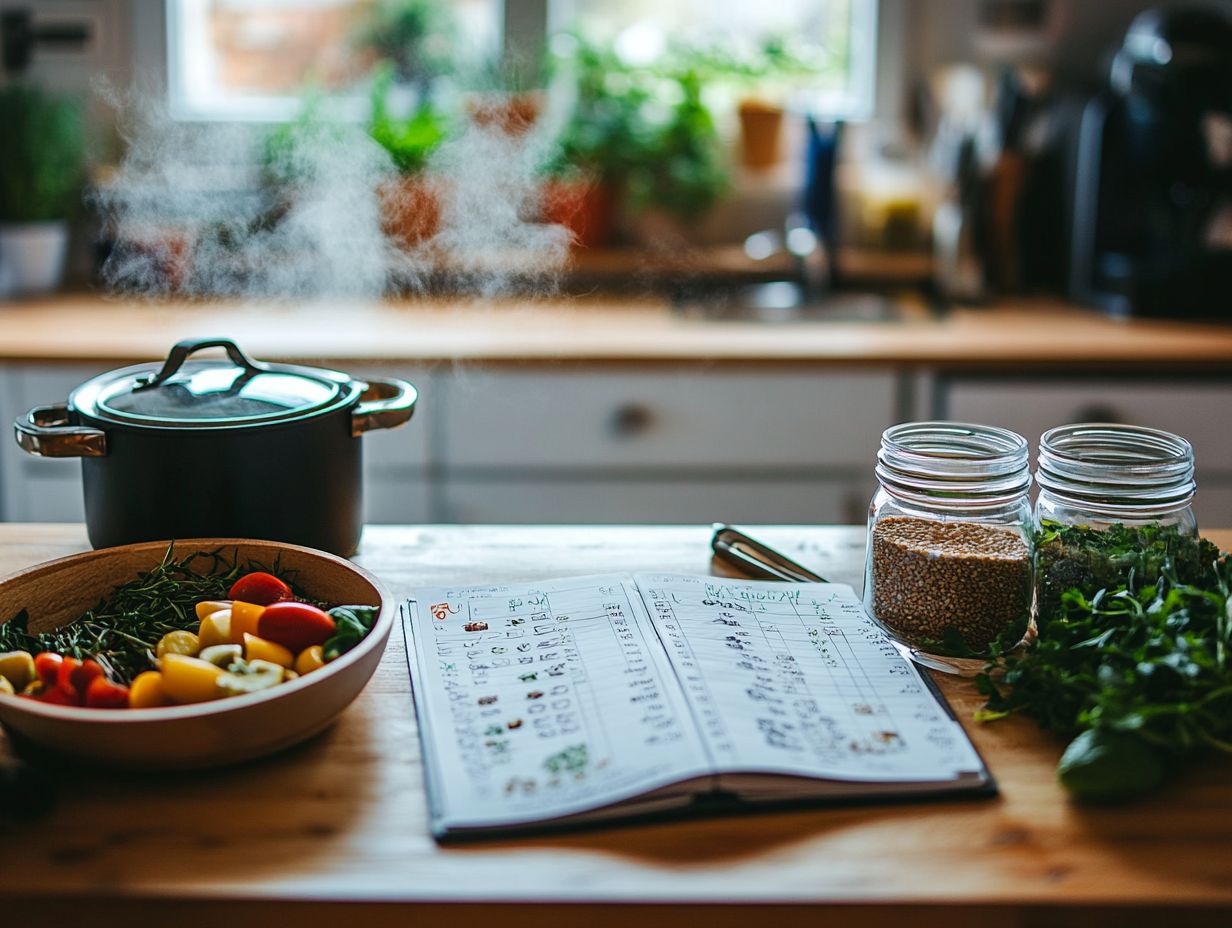
Creating a meal plan provides you with a structured approach that encompasses various steps designed to help you reach your nutrition goals while enhancing your cooking experience.
By determining your weekly food budget and selecting appropriate recipes, you can efficiently streamline meal preparation to accommodate your busy lifestyle. Organizing your grocery shopping accordingly makes the process smoother.
This process allows for the inclusion of simple, easy-to-follow recipes and encourages flexibility for spontaneous meals, making healthy eating not just attainable but enjoyable.
Steps for Planning Meals
Planning your meals requires a careful approach that streamlines your cooking process. For comprehensive strategies, check out the ultimate guide to weekly meal planning. Begin by assessing your pantry and freezer.
Next, select recipes that align with your nutritional goals. Create a detailed grocery list to ensure you have all the necessary ingredients on hand. This systematic strategy promotes organized cooking and minimizes food waste, resulting in a more enjoyable meal prep experience.
Once your inventory is complete, consider the variety you want to bring into your meals. Balancing proteins, grains, and vegetables can keep your menu exciting and nutritious.
When selecting recipes, think about meal prep techniques that fit seamlessly into your lifestyle, such as batch cooking, where you prepare large quantities of food at once, or one-pot meals, which simplify cleanup.
Next, enhance your grocery list by categorizing items based on the layout of your favorite store. This simple trick can make your shopping trips faster and more efficient.
Regularly evaluate your meal plan to allow for adjustments based on seasonal produce or sudden cravings. This way, you ll stay motivated and inspired in the kitchen, ready to whip up something delicious at a moment’s notice.
Meal Planning for Different Dietary Needs
Meal planning for diverse dietary needs demands a careful and considerate approach that caters to various preferences, including vegetarian, vegan, and gluten-free options, all while prioritizing wholesome meals.
This personalized planning can greatly enhance your culinary experience and ensure that every family member’s nutritional requirements are satisfied.
By integrating an array of meal ideas and leveraging specialized recipes, you can craft a balanced meal plan that truly respects and reflects everyone s dietary restrictions and preferences.
Vegetarian, Vegan, and Gluten-Free Options
When you re meal planning for vegetarian, vegan, and gluten-free diets, it s exciting to explore a diverse array of meal options that align with your specific nutrition goals.
This means embracing plant-based ingredients and gluten-free alternatives to create balanced and flavorful dishes.
By incorporating cooking tips and simple recipes tailored to these dietary preferences, you can ensure everyone enjoys nutritious, delicious meals without sacrificing taste or variety.
Consider starting with hearty grain bowls filled with quinoa, roasted vegetables, and a zesty tahini dressing perfect for all three diets.
For an added protein punch, lentils or chickpeas make excellent companions. A vibrant vegetable stir-fry, using gluten-free soy sauce and a mix of seasonal vegetables, not only provides a feast for the eyes but also maximizes nutrient intake.
Don t shy away from experimenting with spices and herbs; they can elevate even the simplest of dishes. If you re looking for a fulfilling energy boost, snacking on almond butter with apple slices is a delightful choice.
Keep in mind the importance of including diverse sources of vitamins and minerals, ensuring your meals cater to various nutritional needs throughout the week.
Quick Tips: Start planning your meals today for a healthier tomorrow!
Ready to Make Meal Planning Fun and Budget-Friendly?
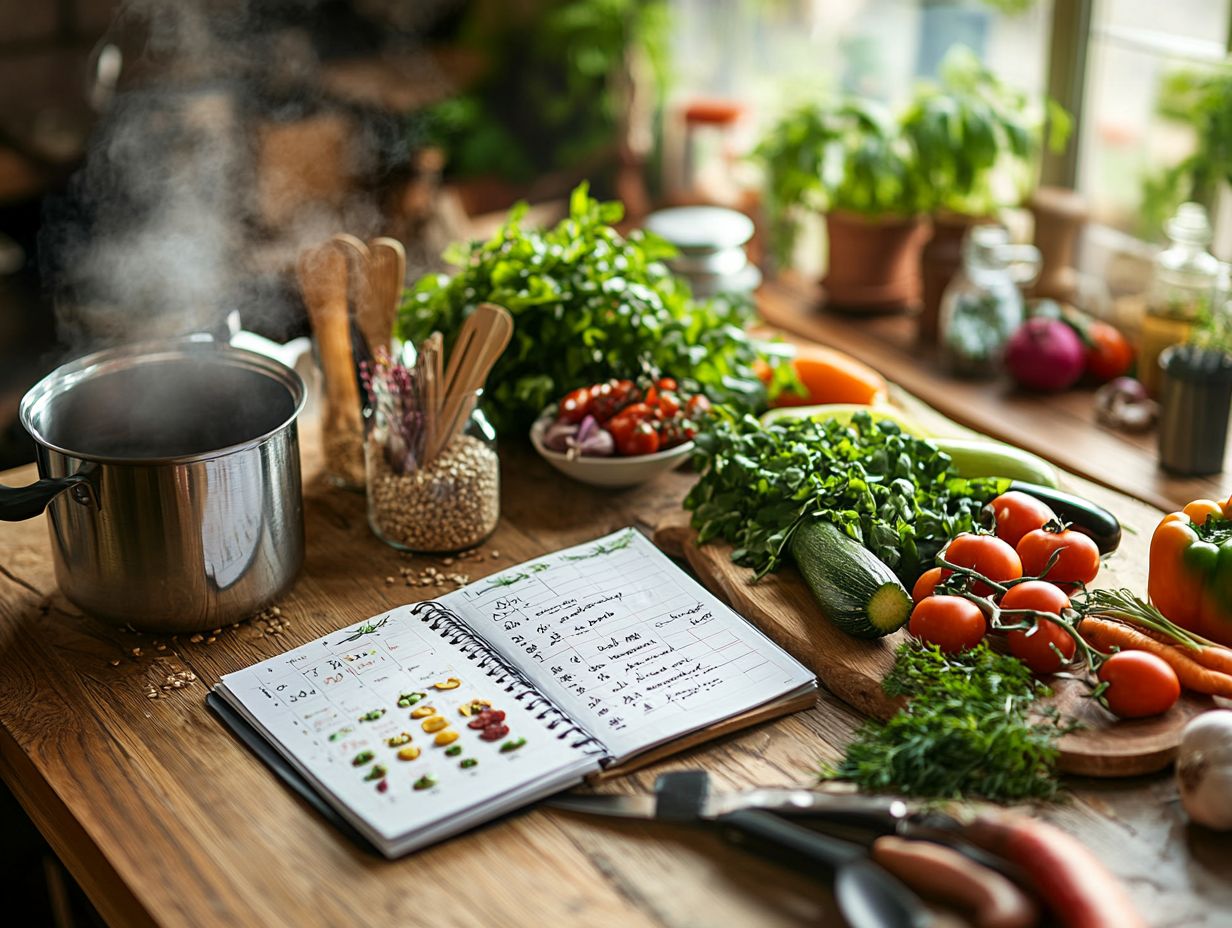
Implementing strategies for efficient and cost-effective meal planning can elevate your cooking experience and help you stick to your food budget. By prioritizing organized grocery shopping and reducing food waste, you can maximize the value of your meals while maintaining a variety of ingredients.
Integrating meal prep techniques into your routine makes cooking spontaneous and ensures that you always have healthy options readily available.
Maximizing Ingredients and Reducing Waste
Maximizing your ingredients while minimizing waste is crucial for an effective meal planning strategy. This can lead to significant savings and improved food management.
Plan meals that use similar ingredients across multiple recipes to ensure that nothing goes to waste. Implementing proper food organization techniques will help you keep track of your pantry and freezer.
This approach not only streamlines your cooking process but also sparks creativity in the kitchen. When choosing recipes, look for those that share staples like grains, vegetables, and proteins for a diverse yet cohesive menu.
For example, a roasted chicken can be the star of one meal, and you can transform the leftovers into a hearty soup or salad the next day.
Using clear storage containers and labels will help you track what you have on hand, preventing spoilage. Embracing these planning methods saves you money and fosters a more sustainable approach to cooking.
Meal Prep and Cooking Techniques
Meal prep and cooking techniques are essential to making your kitchen routine efficient and enjoyable. Incorporate time-saving meals and clever cooking shortcuts to optimize your efforts while achieving your nutritional goals.
An organized approach to cooking simplifies the process and offers greater flexibility in meal planning, especially when you learn how to use a slow cooker for meal planning, making it easy to adjust your schedule as needed.
Time-Saving Strategies for Busy Schedules
Implementing time-saving strategies is vital for anyone with a busy schedule who wants to maintain meal planning and healthy eating habits.
Prioritize meal prep and organized cooking to cut down on food preparation time throughout the week. Techniques such as batch cooking (preparing large amounts of food at once), using convenience items, and planning for spontaneous meals ensure quick and nutritious options are always available.
Engaging in meal prep at the start of the week sets you up for success. Consider weekly meal planning on a budget with one-pot recipes or using slow cookers to streamline your cooking process without needing constant attention.
Stock your pantry with essential items and pre-chopped vegetables to remove obstacles when time is tight. Embrace these efficient cooking methods to align your meals with your nutritional goals, making healthy eating attainable amid a hectic lifestyle.
Frequently Asked Questions
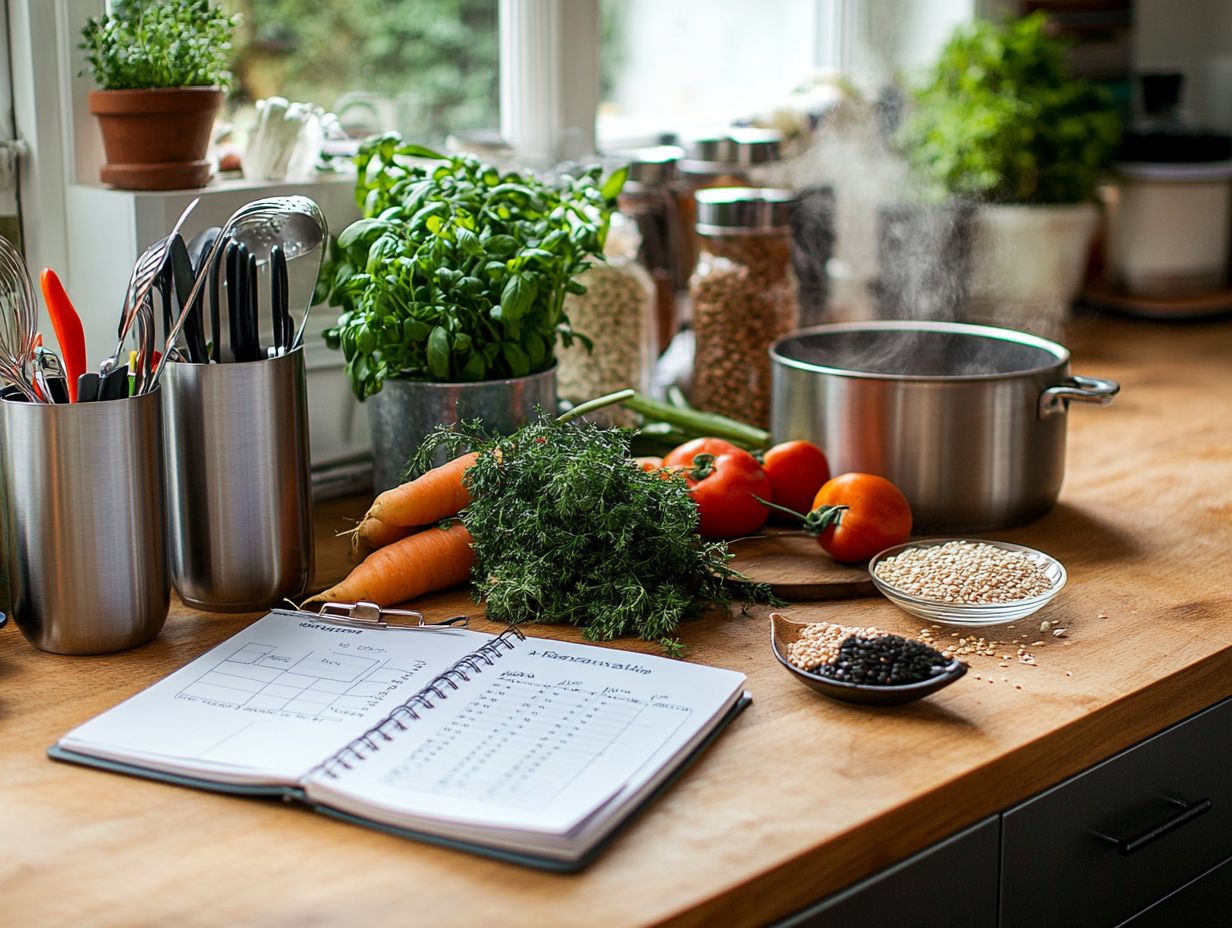
What is meal planning and why is it important for beginner cooks?
Meal planning is the process of deciding in advance what meals to prepare for a certain timeframe. It helps beginner cooks save time, money, and effort in the kitchen by providing a clear plan and avoiding last-minute decisions.
How do I start meal planning as a beginner cook?
Start by making a list of your favorite meals and their ingredients. Pick a specific day of the week to plan your meals for the upcoming week. You can also use online meal planning tools or apps to simplify the process.
Are you ready to start meal planning this week? Share your experiences with us!
What are some benefits of meal planning for beginner cooks?
Meal planning helps beginner cooks save money by cutting unnecessary grocery purchases. Additionally, meal planning for beginners reduces food waste and encourages a healthy diet by allowing you to prepare nutritious meals in advance.
How can I make meal planning easier?
Make meal planning a breeze! Incorporate leftovers and use simple recipes with common ingredients.
Plan meals around your schedule. Choose quick and easy meals for busy days.
What are some easy meal planning ideas for beginner cooks?
Create a weekly meal schedule and stick to it. Choose versatile ingredients that can be used in various meals.
Prep ingredients in advance to save time in the kitchen.
How can I involve my family in meal planning as a beginner cook?
Involve your family by asking for their input on meals. Delegate tasks like grocery shopping or meal prepping to make the process collaborative and fun.


